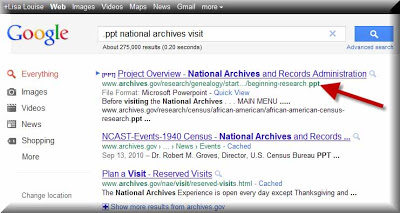Blog

If I don’t say this I think my head will explode 3/7/10
I’ve been reading the blogs and Facebook postings about Who Do You Think You Are? and there’s an odd theme that keeps rearing it’s head that IMHO is off the mark. I’m surprised that this particular criticism of the show continues to surface because I think NBC, Ancestry and the producers have been pretty straight forward about what the goal of the show is. They probably didn’t think they had to say what the goal is not.
If you’d like to learn more about how to research your family history, I invite you to listen to the Family History: Genealogy Made Easy podcast. It’s free and will walk you through the research process step-by-step.

File Search Trick, and Prepping for an Archive Visit
Podcast Listener Joan wrote me recently: “I get to spend a day at the National Archives. What should I do to prepare to take full advantage of the visit? I checked their website, but it was not as helpful as I hoped. Any suggestions?”
While this first resource is from the National Archives in the UK, it’s applicable to archives in other countries as well. Check out their video series called Quick Animated Guide.
Another good approach is to search for presentations on archive visits using Google. By conducting a ‘file type search’ in Google you can uncover presentations posted on the Web that are geared to doing research at the National Archives.
This little genealogy search gem can come in quite handy. Sometimes you know exactly what kind of file or document you are looking for online. By searching for the keywords of the subject and then adding .ppt (the file extension for Powerpoint presentations) Google will pull up only Powerpoint presentations that include those keywords.
Great question Joan and have a wonderful time! Happy hunting everyone!
Video Spotlight
I love having fun with Family History…’nuf said!





